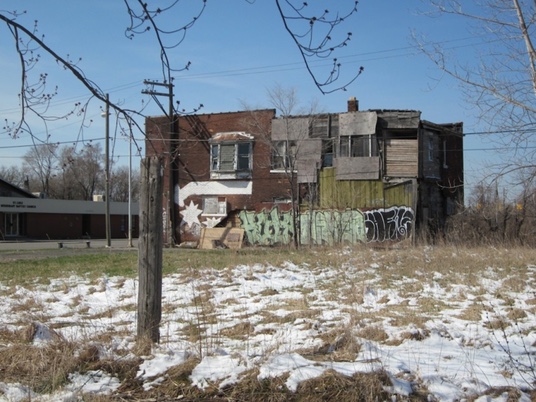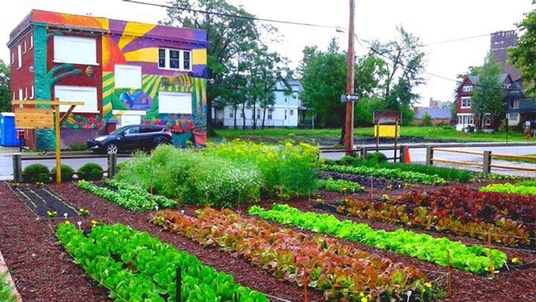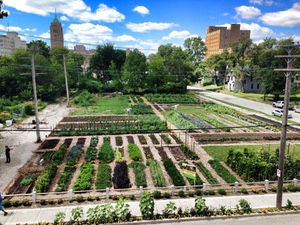
Journeying through large parts of the east side of Detroit can leave you virtually speechless. I’d heard the situation was bad, but I wasn’t quite prepared for what I was seeing. The word “dystopian” doesn’t adequately capture the full extent of the devastation that has been visited upon a very wide swath of the inner realms of the Motor City. It simply doesn’t accurately describe the magnitude of urban decay and abandonment that has beset what once were thriving neighborhoods.
Perhaps a more nuanced and informed understanding of the conditions there can be had by using the term “ruin porn,” and even that descriptive might be half again too weak, too generous. Yeah, it’s that bad.
For a born-and-bred city boy like myself, viewing acre upon barren acre of weed-filled, dumped-upon, totally neglected lots — occasionally interrupted by streets where the few remaining houses (some of them, astonishingly, still occupied) are decaying, crumbling structures, resembling tombstones more than habitable dwellings — is enough to virtually bring a tear to the eye.
I was viewing the wholesale disinvestment of a substantial part of this once great and dynamic city through the window of a tour bus, courtesy of Forward Cities, an organization that brought close to 200 people to a conference in Detroit to take on the monumental task of developing strategies that can assist in halting the decline of America’s urban cores. The very bright people from around the country that were my tour mates fully comprehend that, indeed, if the centers of cities are allowed to wither and die, the disease(s) that caused their demise will spread to inner (and eventually outer) ring suburbs as well. This is a fight we quite simply cannot afford to lose.
The circuitous trip in the motor coach was — at the same instance — both informative and ugly. Right next door to burnt- out shells of what once were homes, desperate families still hang on in a landscape of utter urban despair … waving and smiling gently, even kindly, at us as we cruised past in our air-conditioned land yacht. I avoided looking at their faces, not wanting to objectify them, as if my gaze would turn them into some sort of front-porch museum artifacts … living, breathing and dying testaments to our nation’s abject failure to plan for the future of all of our citizens. When it’s people of your own color, your own kind, living such marginalized lives, it’s gut wrenching.
But succor could be just over the horizon. According to Forward Cities website, the Detroit meeting was the next step in a comprehensive strategy to offer an “opportunity for cross-city collaboration and learning … a group of national partners led by Forward Impact and Friends of New Orleans, and including the Aspen Institute, the Urban Institute, and Issue Media Group” to “launch a robust national learning collaborative project.”
The “initiative is a two-year pilot effort between New Orleans, Detroit, Cleveland and Durham that seeks to identify ways to develop/support more business entrepreneurs, social innovators and neighborhood change-makers from low-income communities of color…” with the goal of “figuring out best strategies for harnessing the talent and creativity of our local entrepreneurial/innovation ecosystems in order to address the most critical issues/challenges that exist in our cities’ most distressed neighborhoods/communities.”
Coming from someone who routinely manipulates words for a living, the above mission statement is as edifying as it is audacious. By selecting Detroit as one of the cities to focus the efforts on, the organization has proven that is doesn’t shy away from challenge. If these desolate areas of Detroit can be saved, then so too can other struggling metropolitan areas around the country be brought back from the brink, the abyss.
I was invited to Detroit to speak on one of the morning panels since the urban farming project I’m involved with, the Vineyards and BioCellar of Château Hough, has gained a degree of notoriety for creating opportunities for hard-to-employ populations. Needless to say, I was honored to be included among such an august group of dedicated and concerned citizens and urban planners from four cities across the country. The enthusiasm emanating from the attendees was reassuring; they clearly were up to the task of turning America’s struggling neighborhoods around.
* * *

As we journeyed through the vast, vacant badlands of Detroit (places where there is virtually no crime, simply because there are no people), I couldn’t help but envision field after field, row after row, of well-tended, healthy crops (certainly high revenue-producing vineyards and hops yards among them) replacing the weeds. But that’s sort of what we humans tend to do: mentally apply what has worked and been successful for us in our own lives and careers to other situations. Sometimes solutions are portable, but, alas, other times they’re not.
A voice from behind me on the bus asked our tour guide, “Who’s staying up nights working on an answer to this problem?” I was tempted to blurt out, “Sometimes the answer is — there is no answer.” It could very well be the area we were traversing is so large, so devastated, so devoid of hope that it has passed the tipping point. Indeed, it could remain desolate and abandoned for the next 50-or 100 years, all the while awaiting redevelopment.
The only viable solution that comes to my mind for the nonce is urban farming, and fortunately there are a number of vibrant urban agriculture/food organizations in Detroit (one of them spearheaded by the dynamic and knowledgeable Devita Davison, the co-director and chief cultivator of FoodLab Detroit, and they are working assiduously to turn the blighted parts of their city into oases of green; healthy environments in which to live, raise families and prosper. However, Davidson stated to me that obtaining parcels of the vacant land from the city has been an uphill battle — all but impossible.
The simple truth is, there is an array of powerful, vested interests working against urban farming efforts. On our trip we passed a gigantic food terminal where produce is trucked in from all over the country. Virtually every city of any size has one. And the owners of these agribusinesses, these mega industrial farms located in rural areas around the country, are quietly attempting to strangle local foods movements while they are still in their infancy; indeed, in the crib.
These businesspersons view it as a zero-sum game, one in which they will lose revenues if local urban farming begins to flourish and prosper. There’s a gigantic industry built on growing and trucking produce 2000 miles and more across country (belching diesel fuel as the lettuce grows more stale every hour of the three-day journey) and they have a tight grip on federal subsidies. They are not about let those subsidies go, or lose market share, not without a putting up a fight. And they have strong, long-standing relationships with the local and national governmental agencies that make the decisions on where and how resources are allocated.
For urban agriculture to really take off in cities like Detroit — and yes, in Cleveland — and become viable, sustainable parts of the American food landscape, the funding pie in Washington has to be re-cut and redistributed more equitably. And for that to happen the local food movements around the country will have to somehow band together and hire at least one skilled Washington lobbyist.

But Detroit could at last be on the verge of making major strides in solving its long-standing and systemic land use problems. Maurice Cox, a man with impressive credentials in both government and academia, was recently hired to serve as planning director for the city. He was the featured dinner speaker later that night, and in response to a question during the Q & A afterwards, he flatly stated that while he certainly doesn’t mind developers making a profit in Detroit, he’s going to negotiate fairer terms for city residents.
“If a developer wants to do something with 10 acres of city land, they should be willing to help us with the development of another 90 acres.” Not to put words in the brilliant man’s mouth, but what I think I heard was, “Fair exchange is no robbery; even swap is no swindle.”
Long-time Detroit resident and architect Sharon Madison, who said that she has been disappointed in her efforts to work with previous administrations over the years, is cautiously optimistic; even hopeful that things will be different under new mayor Mike Duggan, who is giving Cox a relatively free hand in his new position.
During his final remarks of the evening, Mr. Cox stated, “Anything that’s about us, that doesn’t include us, isn’t for us.” I like the sound of that.
America will be waiting, watching — and rooting for you — Detroit. Godspeed in your recovery efforts, and know that Forward Cities will be around to help.

From Cool Cleveland correspondent Mansfield B. Frazier mansfieldfATgmail.com. Frazier’s From Behind The Wall: Commentary on Crime, Punishment, Race and the Underclass by a Prison Inmate is available again in hardback. Snag your copy and have it signed by the author by visiting http://NeighborhoodSolutionsInc.com.
2 Responses to “MANSFIELD: Winning Detroit”
Thomas Wagner
Great report, Mansfield.
Motown’s geographically so much larger than any other rust belt city. That’s both an asset and a liability – so much vacant land. Hope they took you to Belle Isle.
Carol Hunt
Having just visited and toured the urban decay of Detroit two weeks ago, I couldn’t agree more that urban farming would be a fantastic way to fill the endless vacant city blocks. But the lack of people who would actually eat the produce is a valid concern. It would have to be carted out to the suburbs! We did see a few blocks filled with tree farms. We didn’t learn the intended end-use of the trees, possibly just to fill the spaces with green energy…. and that’s just fine! Good luck to Mr. Cox. 78,000 vacant buildings was the number that stuck in my head.